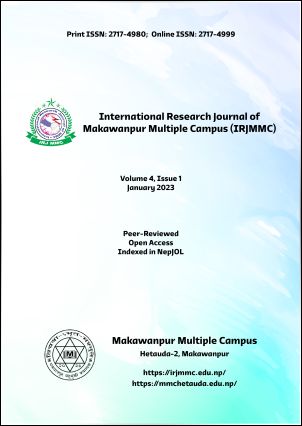Knowledge Distribution and Ethnobiology in Majhi Community of Makawanpur, Nepal
DOI:
https://doi.org/10.3126/irjmmc.v4i1.51861Keywords:
ethnobiology, health, therapeutic, remedy, leavesAbstract
A comprehensive survey aimed at documenting traditional medicinal practices used by Majhi ethnic community was carried out between September and December 2022 in 3 different wards of Bakaiya rural municipality. This study focuses on the traditional medicinal practices using plants and animals. Semi-structured interviews and focus group discussion were carried out during the visit to a total of 25 informants. A total of 32 plants and 15 animals were recorded for different therapeutic uses. The 32 plants species with 26 families, including Lamiaceae having the highest number (3) and Gingeberaceae, Rutaceae, Embretaceae and Fabaceae having (2) representative species and their use value were recorded. The 15 animal species with 15 families, such as Phasanidae, Cervidae, Columbidae with single representative speciesand their use value were recorded. It is projected that the documentation of ethnobiological knowledge will further promote the conservation, use value and bioprospecting of the biological species.
Downloads
Downloads
Published
How to Cite
Issue
Section
License
Copyright (c) 2023 Raj Kumar Gautam, Debendra Prasad Dhakal

This work is licensed under a Creative Commons Attribution-NonCommercial 4.0 International License.
This license enables reusers to distribute, remix, adapt, and build upon the material in any medium or format for noncommercial purposes only, and only so long as attribution is given to the creator.

